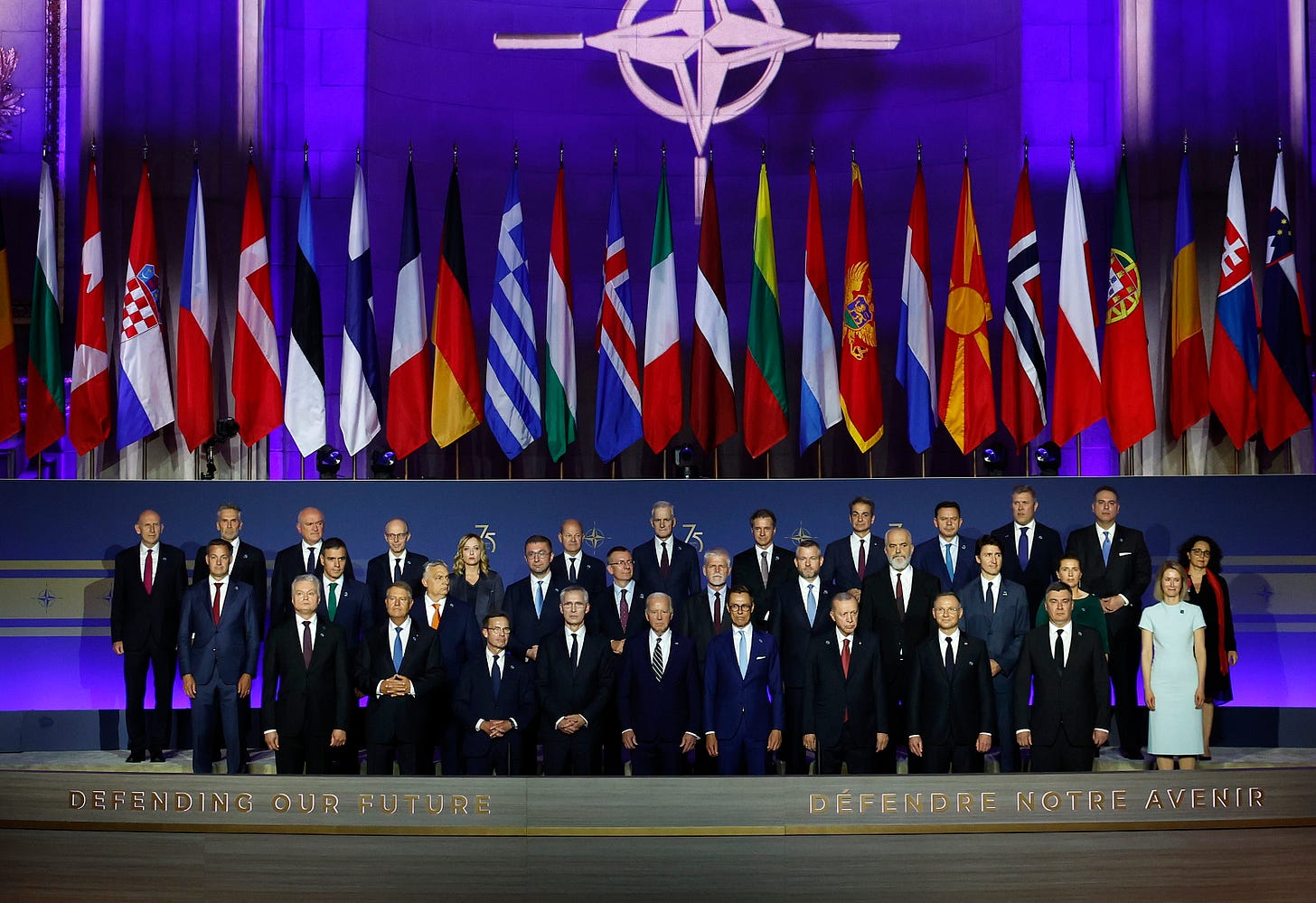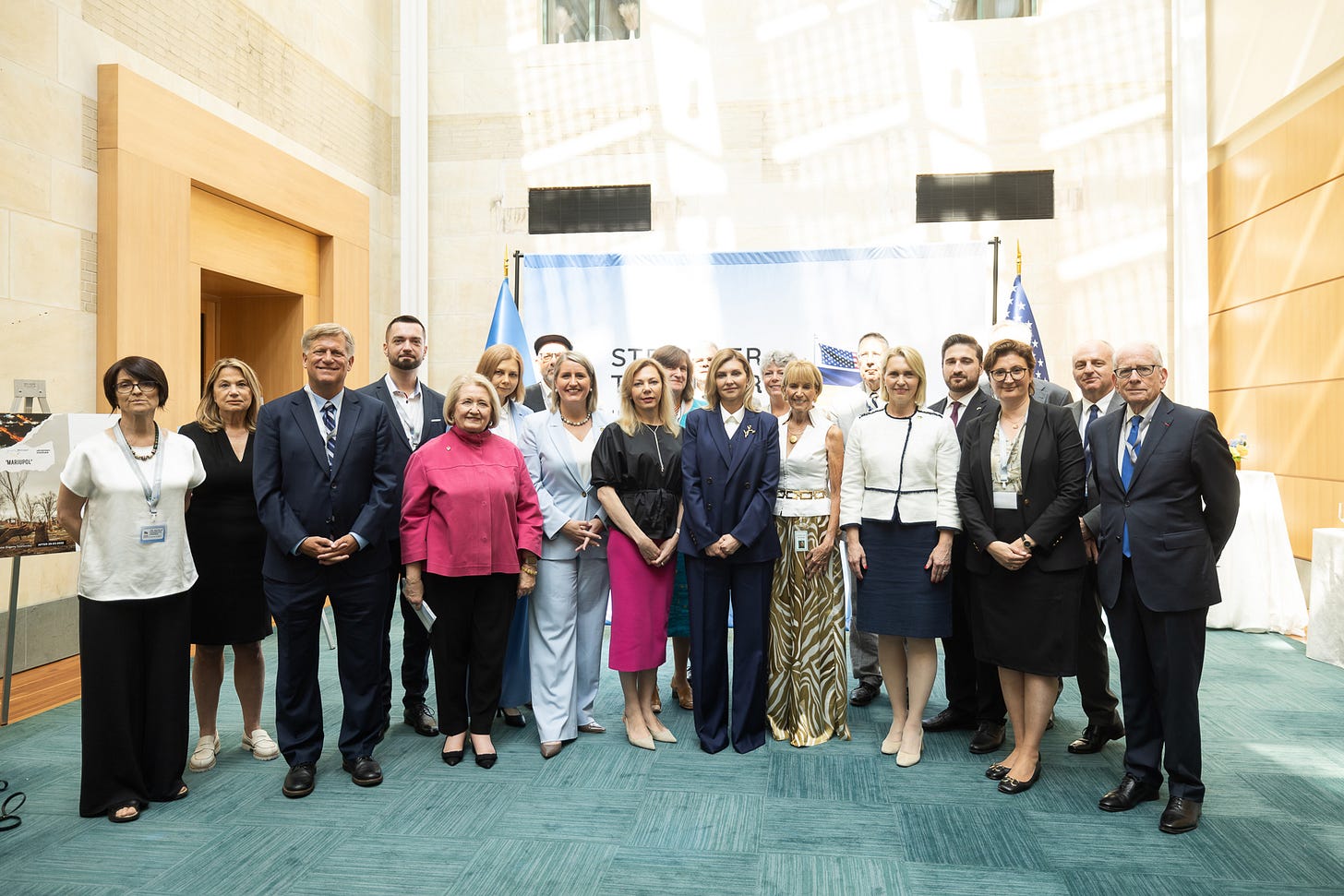Politics versus Policy at the NATO Summit in Washington Last Week
Biden got the political win by demonstrating his leadership of the free world; Zelenskyy got the policy win of “irreversible” into the communique about Ukraine’s path to NATO membership

I spent last week in Washington, on the sidelines of the 75th NATO Summit. I had the chance to have conversations with senior officials from the United States, our European allies, and Ukraine. I also attended the Summit’s opening ceremony – alongside all heads of state of the alliance – at which President Biden spoke. (It was a very cool event!) The next day, unrelated to the Summit, I spoke at a conference organized by the U.S. National Academy of Sciences, called Stronger Together: U.S.-Ukraine Partnership in Education and Science, where the First Lady of Ukraine, Olena Zelenska, delivered the keynote. It was a busy week. Here are a few takeaways:
For the Biden administration, the main goal of this Summit was to help reelect President Biden. Politics trumped policy. But that prioritization was the right one for the future of NATO as well. Biden’s reelection makes it more likely that the policy issues put on hold for this Summit will be addressed and eventually implemented at future summits. Trump’s reelection means that the very future of the alliance will be in question again.
Allies understood this logic. Everyone, except for possibly Hungarian Prime Minister Viktor Orbán, wanted a successful summit that demonstrated unity and highlighted President Biden’s role as the leader of the alliance and the free world more broadly. And even Orbán refrained from public displays of disunity; though he did later visit Mr. Trump in Florida, openly endorsing him.
The Ukrainian delegation at the Summit, headed by President Zelenskyy, also avoided making any direct, confrontational references regarding its desire for faster NATO membership. Different from last year’s NATO Summit in Vilnius, there was no drama at all in Washington about this issue or any other NATO-related issue. Almost all issues and communiqué language were settled on well in advance of the opening ceremony. Since Ukraine is still at war with Russia, Biden and his team wanted to avoid extending an invitation to Ukraine to join the alliance at this Summit, because Trump would have portrayed that decision as Biden dragging the United States into World War III. (Trump and other GOP leaders already make this ridiculous argument; an invite to Ukraine would have only added fuel to this fiery claim.) By delaying the issuing of an invitation to Ukraine, Biden muted this Trump talking point.
President Biden also got to highlight the progress that he has made regarding burden sharing within the alliance. Ever since Trump was elected president, he has complained that our NATO allies are not “paying up” and, therefore, do not deserve our protection. This insinuates that the former president still believes that NATO is a kind of protection racket in which our European allies pay us to defend them. (That’s not how it works!) But on this issue, Biden had a good story to tell at the Washington Summit, which should be popular with American voters. By the time of last week’s Summit, 23 countries in the alliance had reached the target of spending 2% of their GDP on defense. That number was only 9 when Trump left office. In addition, our allies and friends in Europe collectively provide more assistance to Ukraine than the United States – another positive burden-sharing story for Biden’s reelection campaign.

Biden’s press conference at the conclusion of the NATO summit was almost all about domestic politics – in particular, Biden’s fitness to continue as the presidential candidate of the Democratic party – and nearly nothing about the NATO summit itself. That annoyed some NATO policy wonks. But for Biden, that was time well spent. Who would have predicted a year ago, that television anchors and pundits would be describing Biden’s NATO press conference as the biggest public appearance of his political career?
Regarding policy at this NATO summit, there were two big achievements and one failure.
The biggest success of the summit was this paragraph about Ukraine’s future membership in NATO in the final communiqué:
Ukraine has become increasingly interoperable and politically integrated with the Alliance. We welcome the concrete progress Ukraine has made since the Vilnius Summit on its required democratic, economic, and security reforms. As Ukraine continues this vital work, we will continue to support it on its irreversible path to full Euro-Atlantic integration, including NATO membership.
This means that Ukraine’s membership is a question of not whether but when. To be sure, Ukraine must continue to make progress on “its required democratic, economic, and security reforms” to join the alliance – progress that Ukrainian officials think they are making. The communique, however, did not say that Ukraine’s membership is contingent on how well they implement these reforms; rather, the NATO document said explicitly that its path to membership is irreversible.
“Irreversible” is important, because some of those advocating for peace negotiations between
Russia and Ukraine now want to take NATO membership off the table to get Putin to join such talks. That would be a catastrophic mistake. First, as I learned from negotiating with Putin’s government, the Kremlin will pocket any concession without giving anything in return unless compelled to do so. Sweeteners don’t work with them. (I wrote about negotiating with the Russians in From Cold War to Hot Peace.) More importantly, however, NATO membership in Ukraine is the only way to guarantee long-term peace in Ukraine. And if God forbid, Zelenskyy has to agree to not try to reunify his country by force to achieve a ceasefire, he is going to need a big deliverable as compensation. NATO membership must be that. With NATO membership, Ukraine will have to worry forever about another future Russian attack. So, this language in the communiqué should help stop these bad ideas floating around about Ukraine giving up NATO membership as part of future peace talks.
This paragraph in the NATO communique was also an important achievement:
[NATO] Decided to establish the NATO Security Assistance and Training for Ukraine (NSATU) to coordinate the provision of military equipment and training for Ukraine by Allies and partners. Its aim is to place security assistance to Ukraine on an enduring footing, ensuring enhanced, predictable, and coherent support. NSATU, which will operate in Allied states, will support Ukraine’s self-defence in line with the UN Charter. NSATU will not, under international law, make NATO a party to the conflict. It will support the transformation of Ukraine’s defence and security forces, enabling its further integration with NATO.
NSATU (a horrible acronym) establishes a parallel multilateral track for assisting Ukraine that can continue even if Mr. Trump wins reelection and decides to discontinue aiding Ukraine. In fact, many conversations in Washington last week revolved around “Trump-proofing” the alliance, including its mission to assist Ukraine.
Biden refrained from making one policy change last week that I think would have been both good policy and good politics. After Putin bombed Okhmatdyt Children's Hospital in Kyiv – the biggest children’s cancer hospital in Ukraine – killing at least 44 people, Zelenskyy asked Biden for permission to use American long-range missiles to strike back the bases from which these Russian missiles were launched. Biden refused. That was a mistake. As codified in the UN Charter, Ukraine has the right to self-defense. When attacked, they should have permission to strike back. American voters understand and sympathize with the right to self-defense, especially when children, being treated for conditions like cancer, are attacked. So far, Biden disagrees. I hope he will reconsider his position on this issue.
Of course, everything that was agreed to at this NATO summit could be reversed if Mr. Trump is reelected, including the language about Ukraine’s irreversible path to membership in NATO. More on that in a future essay.
For me personally, it was fun to be back on the 7th floor of the State Department, having meals with foreign ministers, and attending ceremonies with dozens of heads of state. I love my job at Stanford, but miss public service. I will have more to say on that topic – academia versus public service – in a future essay as well.




Great to read this summary, thank you.
Forgive me, but I think there might be an important typo: "With NATO membership, Ukraine will have to worry forever about another future Russian attack." Should this not be "WithOUT..." (or "...Ukraine will NOT have to worry..."
Dear Michael;
{please sjhare with me what you mean by "policy win" in enough detail for me spot one if it happened.
Cordially,
Terry Oldberg
Engineer/Scientist/Public Policy Researcher
Los Altos Hills, California
2-650-519-6636 *niibuke(
terry_oldberg@yahoo.com (email)